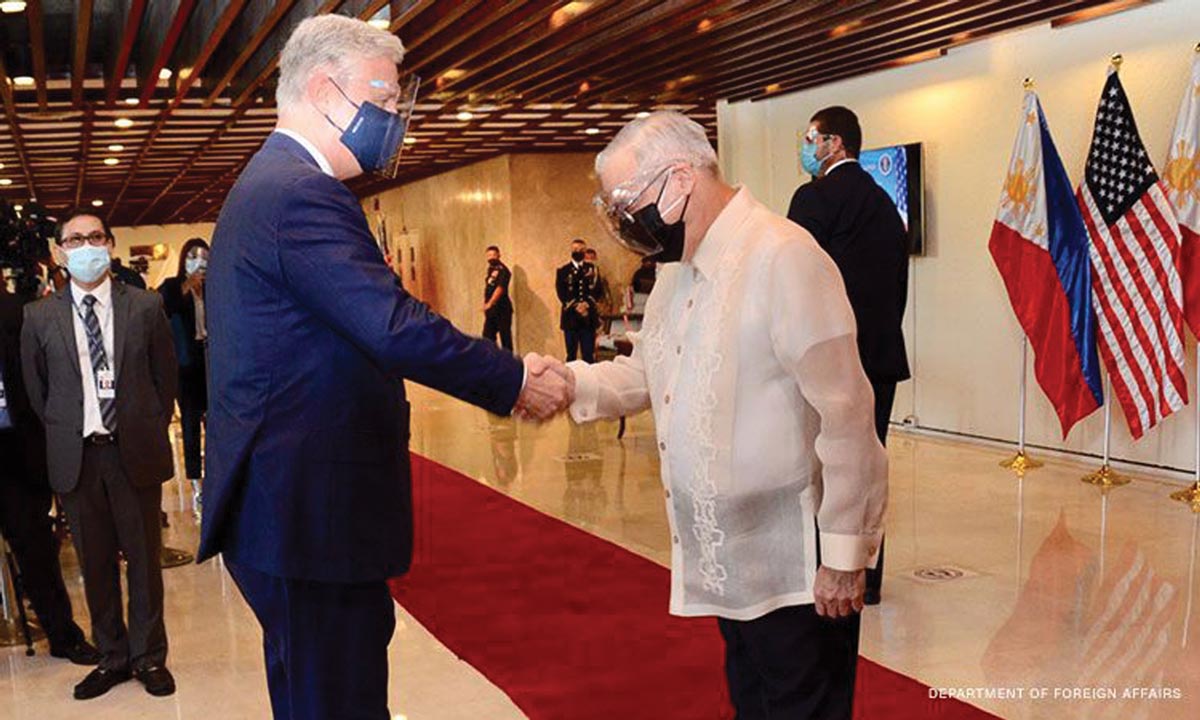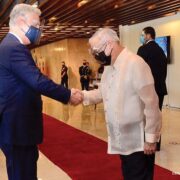
THE United States on Monday, November 23, reiterated that it will continue to support the Philippines’ claim on the West Philippine Sea.
“Our message is we’re going to be here, we’ve got your back, and we’re not leaving,” U.S. national security adviser Robert O’Brien said.
He recently visited the Philippines to lead the ceremonial turnover of $18 million worth of precision guided munitions and other weapons system for use by the military to counter terrorism. He was welcomed by Foreign Secretary Teodoro Locsin Jr., Executive Secretary Salvador Medialdea, and Finance Secretary Carlos Dominguez III.
O’Brien maintained that the U.S. stands with the Philippines in rejecting China’s maritime claims in the West Philippine Sea.
“We stand with the Philippines in protecting your sovereign rights, your offshore resources and all those rights [that] are consistent with international law,” he said.
“Those resources belong to the children and grandchildren of the people here. They belong to the Philippine people,” he added. “They don’t belong to some other country that just because – they may be big and they may be bigger than the Philippines – they can come take away and convert the resources of the Philippine people. That’s just wrong.”
Suspension of VFA abrogation
O’Brien also welcomed the Philippines’ decision to suspend anew the termination of the Visiting Forces Agreement (VFA) between Manila and Washington.
“We’re grateful for the initial 6 months. We think it would be better if it was a year a longer but we’ll have to wait and see. That’s ultimately a decision for the government of the Philippines,” he said.
He also said that he is batting for a longer suspension of the VFA abrogation in order for the U.S. and the Philippines to discuss the treaty more.
“We’d obviously like to see that longer and that’s something I spoke with Secretary Locsin about is if we extend it a further period of time so we can have some negotiations to address the important concerns on both sides of that treaty and that agreement and not be up against an artificial deadline,” O’Brien said.
Locsin on Nov. 11 announced that President Rodrigo Duterte has extended the suspension of the VFA to “to enable us to find a more enhanced, mutually beneficial, mutually agreeable, and more effective and lasting arrangement on how to move forward in our mutual defense.”
China hits back
China, for its part, slammed O’Brien for his remarks, accusing the U.S. top security adviser of “sowing discord” between China and the Philippines.
“He blatantly accused China on no ground, grossly interfered in China’s internal affairs, deliberately exaggerated regional tensions and attempted to sow discord between China and the Philippines,” the Chinese Embassy in Manila said Monday.
“We firmly oppose these remarks which are full of Cold War mentality and wantonly incite confrontation. It shows that his visit to this region is not to promote regional peace and stability, but to create chaos in the region in order to seek selfish interests of the U.S.,” it added.
The consulate also claimed that the U.S. is “the biggest driver of the militarization of the South China Sea” as well as “the most dangerous external factor endangering the peace and stability” in the contested waters.
“With the concerted efforts of China and ASEAN (Association of Southeast Asian Nations) countries, the situation in the SCS remains stable and is improving. We, the regional countries, have the will, wisdom and capability to properly handle the SCS issue and achieve long-term stability, development and prosperity in this region,” it added.
The embassy asked the U.S. to “respect China’s territorial sovereignty and maritime rights and interests in the SCS.”
“[R]espect the joint efforts of China and ASEAN countries for maintaining a peaceful and stable South China Sea and stop interfering and inciting confrontation in the SCS,” it stressed.
Malacañang, on the other hand, refused to comment on the accusations made by O’Brien and China.
“I cannot speak either for the national security adviser of the U.S. or the spokesperson of China. I can only speak for the president. And the president has said that there will be increased tensions among superpowers in the region. We do not want to take part in that drive for hegemony,” said presidential spokesperson Harry Roque.
“We will assert our national interest and we would want a peaceful resolution to the West Philippine Sea dispute,” he added.






